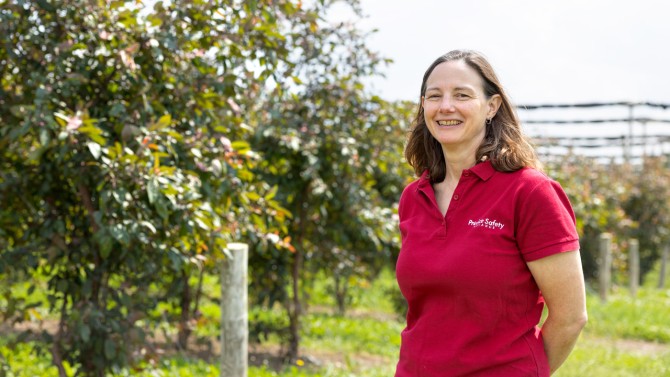For the last 15 years, Cornell has helped Wegmans and its growers comply with government regulations and keep consumers safe from foodborne illness. Fresh fruits and vegetables account for a significant portion of outbreaks, in part because they are often grown in open fields in soil, and in part because they are frequently consumed raw.
Farmers and produce buyers meet these challenges by doubling down on food safety protocols, from practices in the field to new technology in the grocery aisle. The Cornell-based Produce Safety Alliance (PSA) has been essential in effectively disseminating information and instituting new training, according to Steve Strub, manager of produce food safety for Wegmans Food Markets.
Steve Strub, manager of produce food safety for Wegmans Food Markets.
The PSA was established in 2010 through a cooperative agreement between Cornell, the U.S. Department of Agriculture and the Food and Drug Administration.
Strub said a lot of his growers are people he's known for more than a quarter century, and that he spends much of his time visiting the farms and having hard conversations about what is required to keep fruits and vegetables safe.
"In 2010, we started working with the Produce Safety Alliance," he said. "It was not long after the spinach E. coli outbreak occurred, which affected 26 states and Ontario, Canada; that's what got Wegmans involved."
Strub, who has worked for Wegmans for 28 years, the past nine as produce manager for the company's 110 stores, credits Elizabeth Bihn, director of the PSA and director of the National Good Agricultural Practices (GAPS) Program at Cornell AgriTech, as a central reason the Wegmans-PSA collaboration has been so successful.
"Betsy has been with us since the get-go," Strub said. "Talk about real and practical. She's an annual part of our training; she's the star of our show and has a great connection with our growers. They know her and respect her knowledge and experience. She and her PSA team have been helpful to Wegmans, participating in trainings and sharing their knowledge with our growers."
On every farm, one person must be trained in food safety best practices, per the FDA's Produce Safety Rule as well as Wegmans' own requirement of vendors, he said. The PSA Grower Training curriculum includes seven modules that farmers work through, ranging from worker health and hygiene to agricultural water and postharvest handling and sanitation.
Elizabeth Bihn, director of the Produce Safety Alliance and director of the National Good Agricultural Practices Program at Cornell AgriTech.
"The trainings are pulled together in whatever states we do business in - we invite the experts, reaching out to land-grant universities and state agriculture departments," Strub said. "And food safety trainings aren't just about food safety - they're about decreasing plant diseases, increasing shelf life, less shrinkage at stores and a better overall customer experience."
The Food Safety Modernization Act (FSMA) went into effect in 2011, but its Produce Safety Rule was not completed until 2015, representing the first time produce had been federally regulated. A further phase of FSMA will be instituted in the next few years, adding greater traceability for food categories like produce, as well as increased record-keeping requirements, especially for "high risk" foods.
This will increase the urgency of the work the PSA and Cornell AgriTech do, Bihn said, and challenges persist: Foodborne illness outbreaks in the U.S. rose in 2024, with confirmed cases increasing by 25% compared to the previous year. Several factors contributed to this increase, including changes in food handling practices, increased consumption of certain risky foods, a wider distribution of contaminated products and better science for the detection and tracking of outbreaks.
"So much of this is dependent upon trust," she said. "We work to make sure growers have the information they need to discern between hazards and risks, and are able to effectively do what they need to do to reduce risk."








